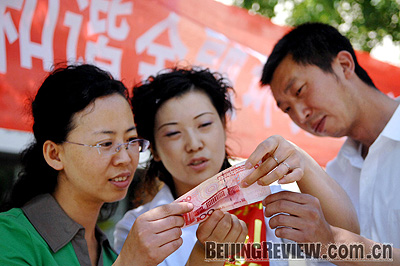|

|
TO THE POINT: A devastating earthquake wreaked havoc on peaceful inland Sichuan Province this week, but its economic impact should be limited because the province is not a major manufacturing center. However, the earthquake might add to inflationary pressure, catching the central bank in a dilemma. China's imports continued strong growth and the country's trade surplus growth rate slowed. SAIC-GM-Wuling Automobile Co. retained its pole position in passenger car sales during the first four months.
By LIU YUNYUN |
Inflation Running High
China is currently challenged by serious inflationary pressure. A recent National Bureau of Statistics (NBS) report shows the consumer price index (CPI), a barometer for inflation, grew 8.5 percent in April, 0.2 percentage points higher than that of March, and 5.5 percentage points higher year on year.
The food price surge-22.1 percent-was still counted as the major trigger for the climbing CPI. Pork prices have remained stable over last few months. The 68.3-percent year-on-year surge in pork prices this April was due to a moderate price in the month last year. Pork price began to soar in June last year from around 20 yuan ($3) per kg to around 30 yuan ($4.28) per kg where it currently stands.
The price of clothing, as well as transportation and communications dropped by 1.4 percent and 1.7 percent, respectively.
Cai Zhizhou, professor at Peking University, said the 8.5-percent CPI growth rate was predictable, but did not show the actual inflationary pressure. Prices of daily consumables like electricity, refined oil and coal, are strictly controlled by the government. "If those factors were fully marketized, the CPI growth rate would be stunning," said Cai.
NBS statistics also showed the producer price index (PPI), another measure of inflation in the wholesale perspective, escalated 8.1 percent in April, 5.2 percentage points higher year on year. This rise was mainly driven by price surges of raw materials, fuel and power. (graph)
NBS Chief Economist Yao Jingyuan warned that the upstream production price rise was spreading to individual consumption, and would further jack up the CPI.
To date, the government has not come up with an overarching recipe for soothing heavy inflationary pressure and excessive liquidity.
The possibility of an interest rate hike was ruled out due to central bank governor Zhou Xiaochuan's remarks on May 4, when he attended the conference of Bank for International Settlements. Zhou said the central bank had a wide choice of tools to choose from to cope with inflation other than interest rate hikes.
Therefore, it came as no surprise when the central bank raised the reserve requirement ratio to 16.5 percent the next day after the CPI data was released, the fourth time this year and the highest in two decades. About 200 billion yuan ($28.57 billion) will be frozen until May 20. The reserve requirement is the amount of money that commercial banks must keep in the central bank.
So far, there has been no interest rate readjustment. The May 12 Wenchuan earthquake in southwest China's Sichuan Province might further diminish recent interest rate hike possibilities. Sinolink Securities Co. Ltd. issued a research report, claiming that the reconstruction work in Sichuan Province would increase credit demand, and the overall lending scale was "very likely" to expand this year.
However, Xie Guozhong, an economist and former Morgan Stanley chief economist of the Asia-Pacific Region, argued the best way to contain inflation expectations was to raise the interest rate to the same level as CPI. Xie suggested one-year deposit rate be set at 6 percent at least, "to reassure the depositors that their money won't depreciate if it is put in the banks."
So far, there has been no interest rate readjustment. The May 12 Wenchuan earthquake in southwest China's Sichuan Province might further diminish recent interest rate hike possibilities. Sinolink Securities Co. Ltd. issued a research report, claiming that the reconstruction work in Sichuan Province would increase credit demand, and the overall lending scale was "very likely" to expand this year.
However, Xie Guozhong, an economist and former Morgan Stanley chief economist of the Asia-Pacific Region, argued the best way to contain inflation expectations was to raise the interest rate to the same level as CPI. Xie suggested one-year deposit rate set at 6 percent at least, "to reassure the depositors that their money won't depreciate if it is put in the banks."
Earthquake Aftermath
The economic impact of the Sichuan earthquake could be much smaller than that of the January-February blizzard that hit the southeast part of the country, a Merrill Lynch report issued on May 13 said.
A total of 66 listed companies based in Sichuan Province and Chongqing Municipality halted trading after a magnitude 7.8 earthquake hit the southwest Wenchuan County in Sichuan Province at 2:28 p.m. on May 12. At its highest the benchmark Shanghai Composite Index rose 1.45 percent that day, but fell 1.08 percent on the news of the earthquake 20 minutes before the closing bell.
| 